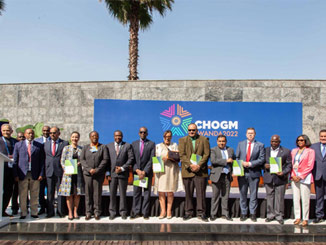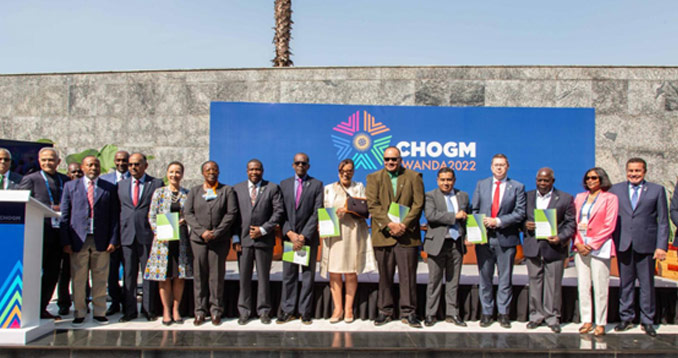

Leaders and senior officials from across the Commonwealth have voiced their robust support for a charter on climate change, biodiversity and land degradation, that would boost coordinated action in these areas among the 54 countries of the Commonwealth.
The document, known as the ‘Living Lands Charter’, was adopted at this week’s Commonwealth Heads of Government Meeting (CHOGM) in Kigali, Rwanda.
The Charter aims to support member countries to effectively deliver their commitments under the three Rio conventions – the United Nations Convention on Biological Diversity (UNCBD), United Nations Convention to Combat Desertification (UNCCD), and United Nations Framework Convention on Climate Change (UNFCCC).
The meeting featured statements from the Prime Ministers of Saint Lucia, Tonga, Mauritius and Fiji (delivered on his behalf by Fiji’s High Commissioner to the UK), who all welcomed the work led by the Commonwealth Secretariat over the past two years to consult with countries and regions in shaping the agreement.
The Prime Minister of Saint Lucia, Hon Philip J. Pierre, said “The Commonwealth Call for Action and Living Lands Charter is a step in the right direction. It holds great promise in strengthening and enhancing for coordinated implementation of relevant actions on the street Rio Conventions, serving as a catalyst for global political will and financing climate action, building resilience, reducing biodiversity, biodiversity, loss, and impeding land degradation.”
The Prime Minister of Tonga, Hon Siaosi Sovaleni (Hu’akavameiliku) said “The need to support climate adaptation, biodiversity and land enrichment measures to protect our communities and natural ecosystems is of great urgency. However, without the necessary financial support, we will be unable to implement any concrete actions and achieve shared goals. The Government of Tonga [supports the] call for increased global funding and a post COVID-19 green recovery.”
The Prime Minister of Mauritius, Hon Pravind Kumar Jugnauth said “I seize this opportunity to express our strong support for the proposed Commonwealth Living Lands Charter that will spur concerted actions for enhancing climate action and fostering efficient management of landmass, soils and terrain. We are gratified that the Commonwealth continues to be at the forefront of the global movement to address climate change.”
The Prime Minister of Fiji, Hon Frank Bainimarama, provided a statement through Fiji’s High Commissioner to the UK, Jitoko Tikolevu. He said “If left unchecked, climate change will undo a lot of the progress made over the past years in development. It can also exacerbate, as we are already seeing, current threats such as food and water scarcity, which can lead to conflict. Doing nothing will end up costing us a lot more than if we take actions now that will lead to more jobs, greater prosperity, and better lives for all, while reducing greenhouse gas emissions and building climate resilience.”
The event also included statements from Ministers from Botswana, Guyana, Namibia, Nigeria, Rwanda and Zambia, along with leaders of international partner agencies such as the United Nations Convention to Combat Desertification (UNCCD), United Nations Institute for Training and Research (UNITAR), Green Climate Fund and International Solar Alliance (ISA).
“Within the Commonwealth, we already have many things in common – be it our language, or our political and financial systems … this should enable us to increase our internal investments and trade” said Rwanda President Paul Kagame, who is also the incoming Chair of the Commonwealth.
While the commonwealth leaders talked about agreements and a better future, advocates are asking for action on human rights violations by mining companies and protection for indigenous peoples such as the Masaai in Tanazania. While western leaders talk about human rights violations in the Ukraine, they are not talking about the host country Rwandan-backed rebels instigated fighting that has caused over 170,000 Congolese to flee their homes since November. Reportedly, Rwanda has deployed 500 troops to assist the M23 rebels. According to the UN, M23 is planning an attack on the major eastern city of Goma in the coming days. Last week Rwandan forces killed a Congolese soldier on the border between the two countries and Congo has closed the border.

Leave a Reply